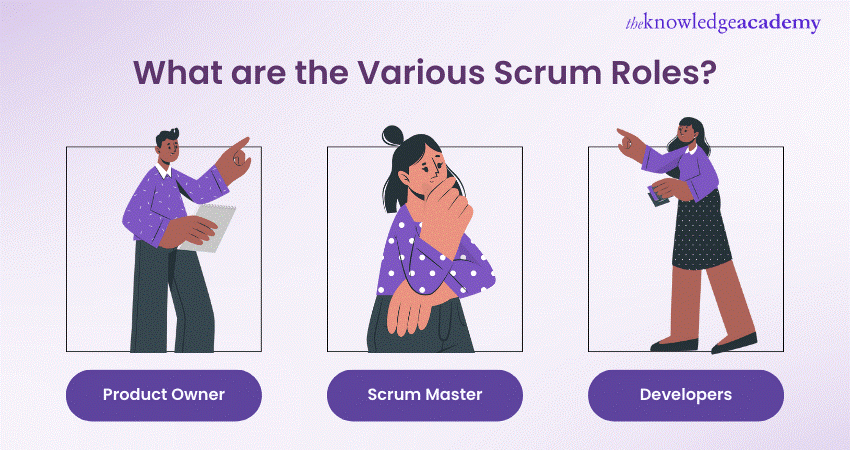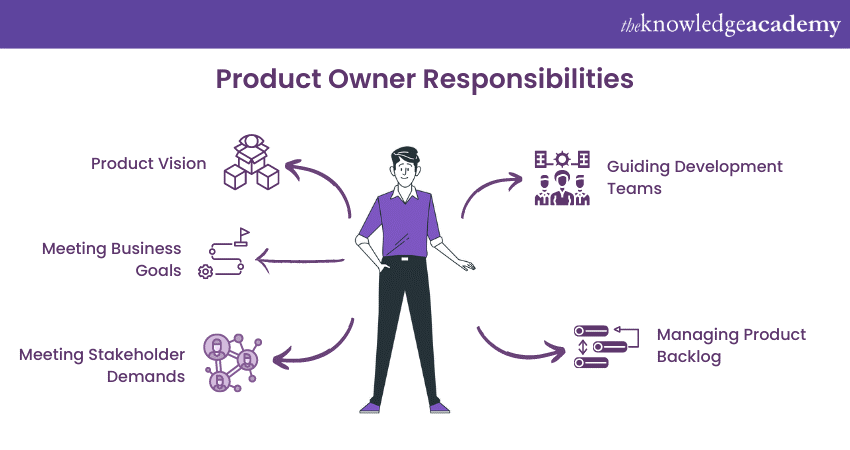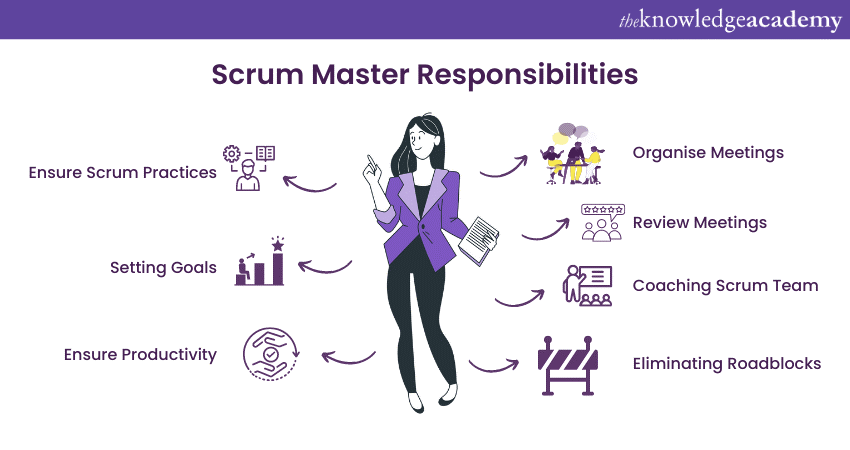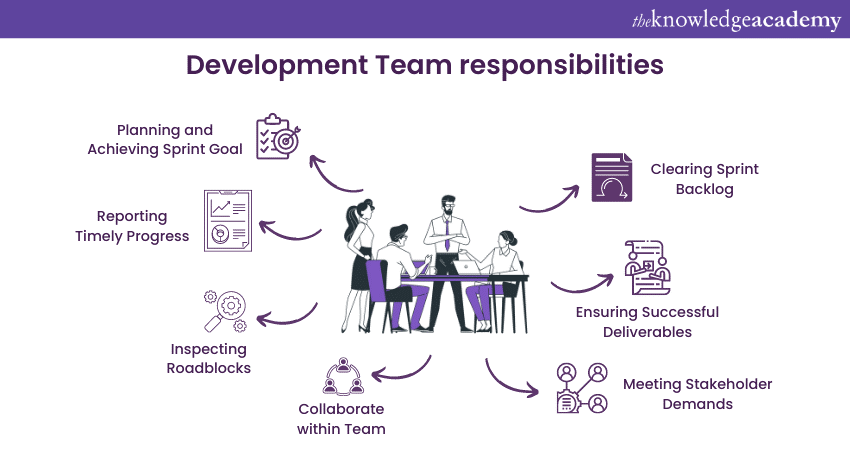We may not have the course you’re looking for. If you enquire or give us a call on +31 208081674 and speak to our training experts, we may still be able to help with your training requirements.
Training Outcomes Within Your Budget!
We ensure quality, budget-alignment, and timely delivery by our expert instructors.

Scrum is one of the most popular Agile frameworks that Development Teams follow to deliver work in sprints, also called Scrum Roles. It comprises of Product Owner, Scrum Master, and Development Team. Each role has a unique set of roles and responsibilities that make up for the project's overall success. In this blog you will find Scrum's major roles. Learn more about the various Scrum roles and their importance, which help make a great scrum team and various career paths that will boost your growth. Read More!
According to the State of Scrum 2017–2018 Survey, 78% of Scrum Teams are of size 5-9 members, 8% are 1-4 members, and 13% of Scrum teams consist of more than 10 members. If you are wondering what roles and responsibilities these Scrum team members perform, you are at the right place. Read this blog to learn more about the various Scrum Roles and their importance, which help make an excellent scrum team.
Table of Contents
1) What are the Three Scrum Roles?
2) How to Build a Scrum Team?
3) Who is a Product Owner?
4) Who is a Scrum Master?
5) What is a Development Team?
6) Conclusion
What are the Three Scrum Roles?
The three Scrum Roles are Product Owner, Scrum Master, and Development Team. While there is only one Product Owner and one Scrum Master in a Scrum team, the Development Team consists of various members such as Software Developers, Designers, Testers, and Team Leads. Besides being in different Scrum roles and having different skillset, they try to achieve a common goal. The whole Scrum team comprises 10 or fewer members.
How to Build a Scrum Team?
Scrum is a framework that guides the Scrum Team to manage and deliver a successful project. Broadly, a Scrum Team consists of individuals or groups that work together in Sprints to achieve the project goal aligning to the Scrum roles. These individuals play the following roles in a Scrum Team:
The process of building a Scrum team starts with identifying the project needs. It helps in understanding which professionals are required to complete the project successfully. The next step is to choose and select the team members with the necessary skills and expertise in their respective fields. The final step is to set the rules and create a plan where the business owner determines the responsibilities of the Scrum Team and establishes the decision-makers. Implementing a Scrum Template can facilitate this process, providing a standardized and efficient framework for building and managing Scrum teams.
Who is a Product Owner?
A Product Owner is a key role in Agile development frameworks, responsible for maximising the value of the product resulting from the work of the development team. They act as a bridge between stakeholders and the development team, ensuring that the product meets user needs and business goals.
Responsibilities of a Product Owner
The typical responsibilities of the Product Owner are as follows:

1) A Product Owner sets a clear direction for the Scrum team, considering inputs from the team members and the Business Owner.
2) They are responsible for tracking the product backlog and updating the tasks in Scrum Board based on changing priorities.
3) They work as a team representative and act as a bridge between the Stakeholders and the Scrum team.
4) They are responsible for collecting feedback from the Business Owner to ensure that productive input is given to the team working on a particular task.
5) The Product Owner can cancel any task from Sprint if they find it repetitive.
6) They are responsible for increasing the Return on Investment (ROI).
Desirable Qualities of a Product Owner
A Product Owner should be knowledgeable to ensure the product quality and the scope of it. They should be available for the stakeholders and the team to understand the product and be the link between the Business Owner, Stakeholders and the Scrum Team. The Product Owner should be decisive in nature so they can make the right decisions about the product.
Learn the key benefits of using agile alongside Scrum by registering for our Managing Agile Projects With Scrum Sign up today!
Who is a Scrum Master?
A Scrum Master is like a hero of the team who is responsible for keeping the team united and working towards a common goal. They are the ones who are accountable for getting tasks done efficiently. A Scrum Master helps keep the team on track like a leader leading many people. The team might get lost or start working in different directions without the Scrum Master.
Responsibilities of a Scrum Master
Given below are some of the typical responsibilities of a Scrum Master:

With a great role comes greater responsibilities, as is true even for a Scrum Master. Given below are some of the typical responsibilities of a Scrum Master:
1) A Scrum Master is responsible for regularly organising daily meetings and reviewing the sprint.
2) They are responsible for removing any obstacles preventing the team from moving ahead.
3) They also act as a coach to the Scrum Team. They train the team on the Scrum framework and ensure productivity.
4) The Scrum Master is responsible for working as a bridge between the Product Owner, Stakeholders, and the Scrum Team.
5) Scrum Masters should continuously work for the team’s progress and ensure they follow the Scrum practices efficiently.
Desirable Qualities of a Scrum Master
A Scrum Master plays a crucial role in any organisation. They must be humble to give enough credit to the team for their performance. A good Scrum Master should be empathetic and actively listen to their team. They must encourage the team to be creative and purposeful and treat each of them respectfully. Finally, a great Scrum Master is someone who puts the need of their team first and works to create a culture where everyone can thrive for betterment.
Acquire knowledge of Scrum Team roles and responsibilities with our Scrum for Teams Course Register now!
What is a Development Team?
The Development Team comprises Software Developers, Designers, Testers, and Tech Leads. A Development Team's ideal size is between three to nine people, and this team does not include the Product Owner and Scrum Master.
Besides each member possessing their unique skills, they collaborate to achieve the sprint goals. They are the smallest yet most powerful unit of the Scrum Team that acts as a building block for ensuring correct Scrum practices.
Responsibilities of the Development Team
The Development Team’s responsibilities are as follows:

1) Their foremost responsibility is to create a solid plan for a sprint and determine the work they can accomplish in one sprint.
2) They work collaboratively to accomplish the project and deliver the stakeholders' demands on time.
3) They closely work with the Product Owner to understand the requirements of the project and the priority tasks accordingly.
4) The Development Team reports progress in daily review meetings to ensure transparency.
5) They are responsible for inspecting the project's impediments and discussing them in sprint review meetings.
Desirable Qualities of a Development Team
An efficient Development Team, particularly in the context of Scrum Sprints, needs to ensure that every member of the Scrum Team is on the same page. It can be achieved by ensuring effective communication and collaboration within the Scrum Team. They must be quick to adapt themselves to evolving technologies. Each team member should ensure they are dedicated to meeting the stakeholder demands. The above qualities are essential for a Development Team to deliver successful outcomes and meet the client's expectations.
Want to be a Scrum Master? Sign up for our Scrum Master Certification today!
Conclusion
Establishing clear and defined Scrum Roles is essential to the project’s success. Each role plays a unique and crucial role in the project. The Product Owner is responsible for checking that the product meets the customer's needs; meanwhile, Scrum Master keeps a check on the Scrum activities and that the Scrum framework is followed correctly.
Learn and understand the principles and values of Agile methodology with our Agile And Scrum Awareness Course Sign up today!
Frequently Asked Questions

Continuous Integration in Scrum is the integration of the code changes frequently into the common repository. It guarantees that testing occurs automatically, problems are corrected rapidly, and working deliveries are made frequently, which is good for Scrum, as it depends upon iterative and incremental development.

The following are the Scrum's 5 events:
a) Sprint: The core cycle delivering increments.
b) Sprint Planning: Defines goals and backlog.
c) Daily Scrum: Syncs progress & plans.
d) Sprint Review: Shares work with stakeholders.
e) Sprint Retrospective: Improves processes.

The Knowledge Academy takes global learning to new heights, offering over 30,000 online courses across 490+ locations in 220 countries. This expansive reach ensures accessibility and convenience for learners worldwide.
Alongside our diverse Online Course Catalogue, encompassing 19 major categories, we go the extra mile by providing a plethora of free educational Online Resources like News updates, Blogs, videos, webinars, and interview questions. Tailoring learning experiences further, professionals can maximise value with customisable Course Bundles of TKA.

The Knowledge Academy’s Knowledge Pass, a prepaid voucher, adds another layer of flexibility, allowing course bookings over a 12-month period. Join us on a journey where education knows no bounds.

The Knowledge Academy offers various Scrum Certification, including the Scrum Developer Training, Scrum for Teams and the Scrum Overview. These courses cater to different skill levels, providing comprehensive insights into Scrum Theory.
Our Project Management Blogs cover a range of topics related to Scrum Master, offering valuable resources, best practices, and industry insights. Whether you are a beginner or looking to advance your Project Management Skills, The Knowledge Academy's diverse courses and informative blogs have got you covered.
Upcoming Project Management Resources Batches & Dates
Date
 Scrum Master Certification
Scrum Master Certification
Thu 9th Jan 2025
Thu 16th Jan 2025
Thu 23rd Jan 2025
Thu 30th Jan 2025
Thu 6th Feb 2025
Thu 13th Feb 2025
Thu 20th Feb 2025
Thu 27th Feb 2025
Thu 6th Mar 2025
Thu 13th Mar 2025
Thu 20th Mar 2025
Thu 27th Mar 2025
Thu 3rd Apr 2025
Thu 1st May 2025
Thu 22nd May 2025
Thu 5th Jun 2025
Thu 19th Jun 2025
Thu 3rd Jul 2025
Thu 17th Jul 2025
Thu 31st Jul 2025
Thu 14th Aug 2025
Thu 11th Sep 2025
Thu 25th Sep 2025
Thu 2nd Oct 2025
Thu 9th Oct 2025
Thu 16th Oct 2025
Thu 23rd Oct 2025
Thu 30th Oct 2025
Thu 6th Nov 2025
Thu 13th Nov 2025
Thu 20th Nov 2025
Thu 27th Nov 2025
Thu 4th Dec 2025
Thu 11th Dec 2025
Thu 18th Dec 2025







 Top Rated Course
Top Rated Course



 If you wish to make any changes to your course, please
If you wish to make any changes to your course, please


